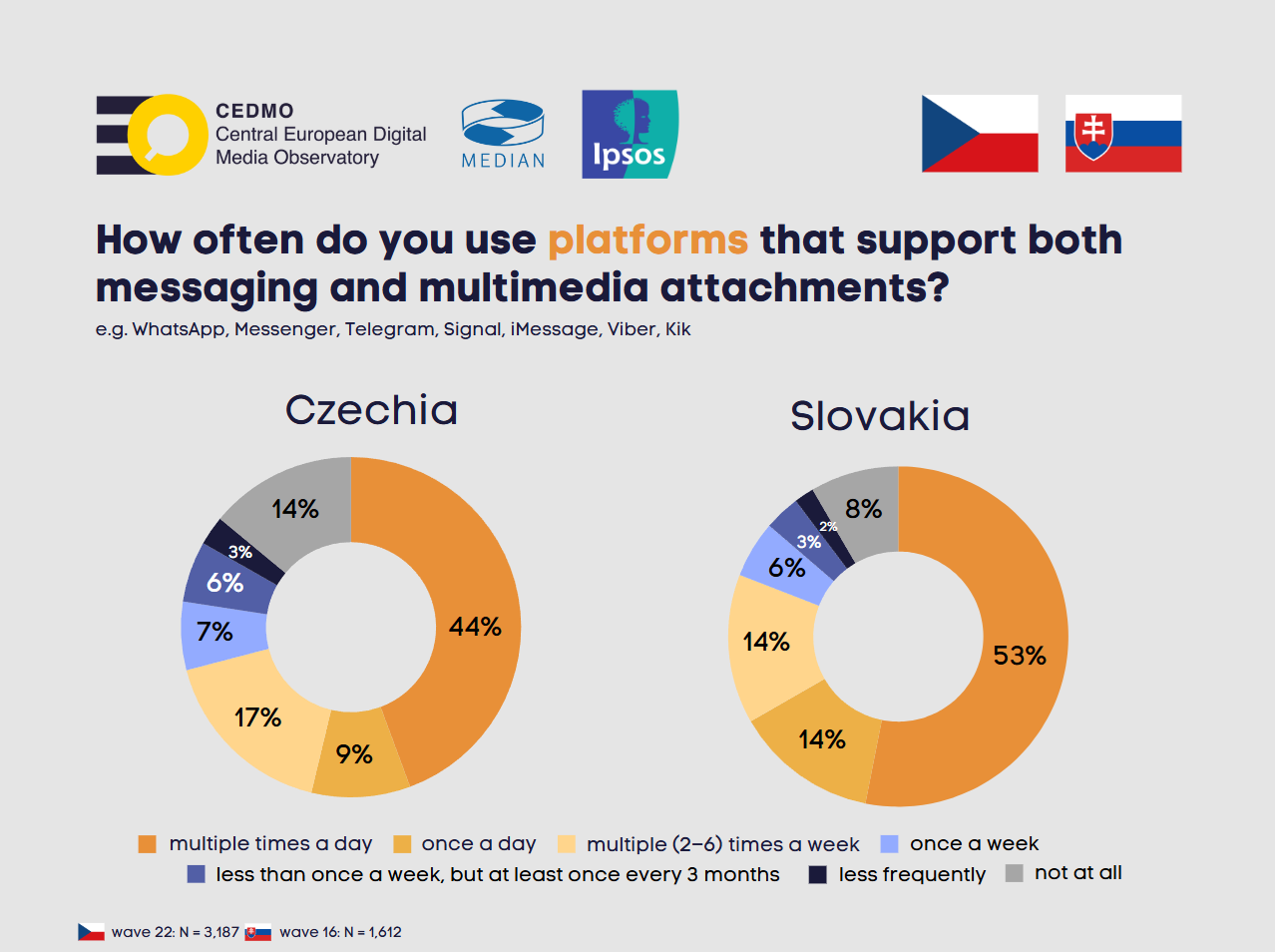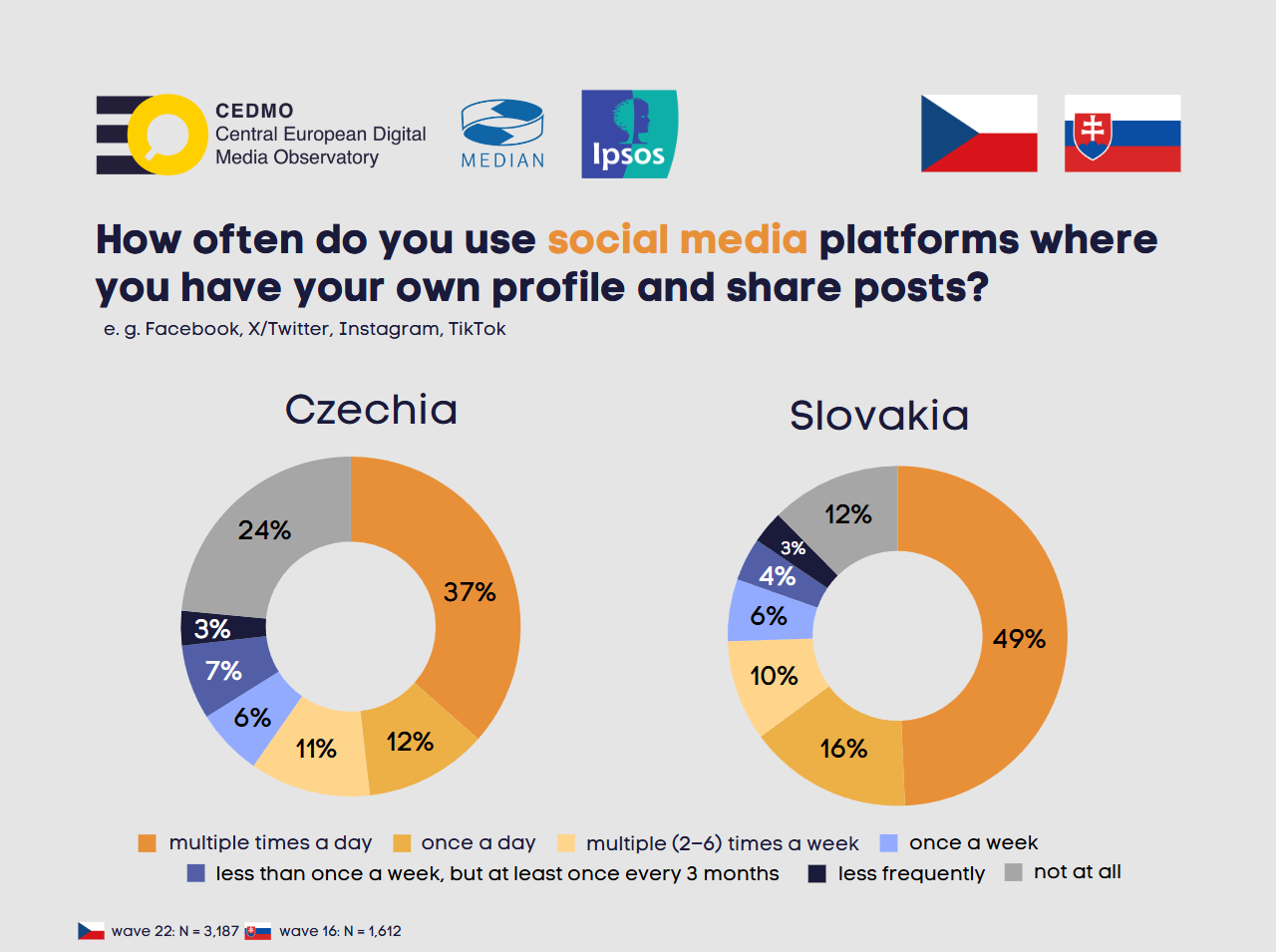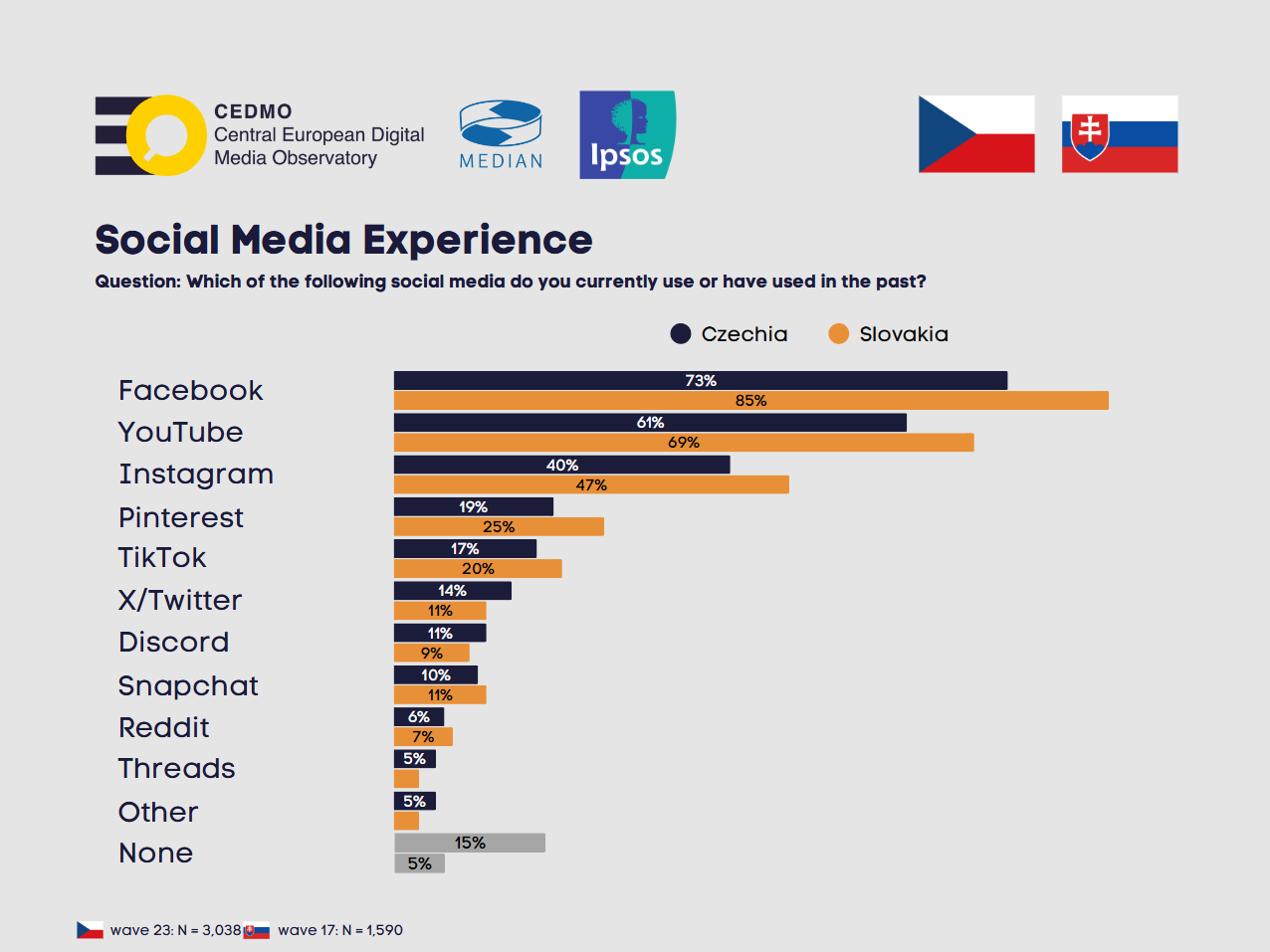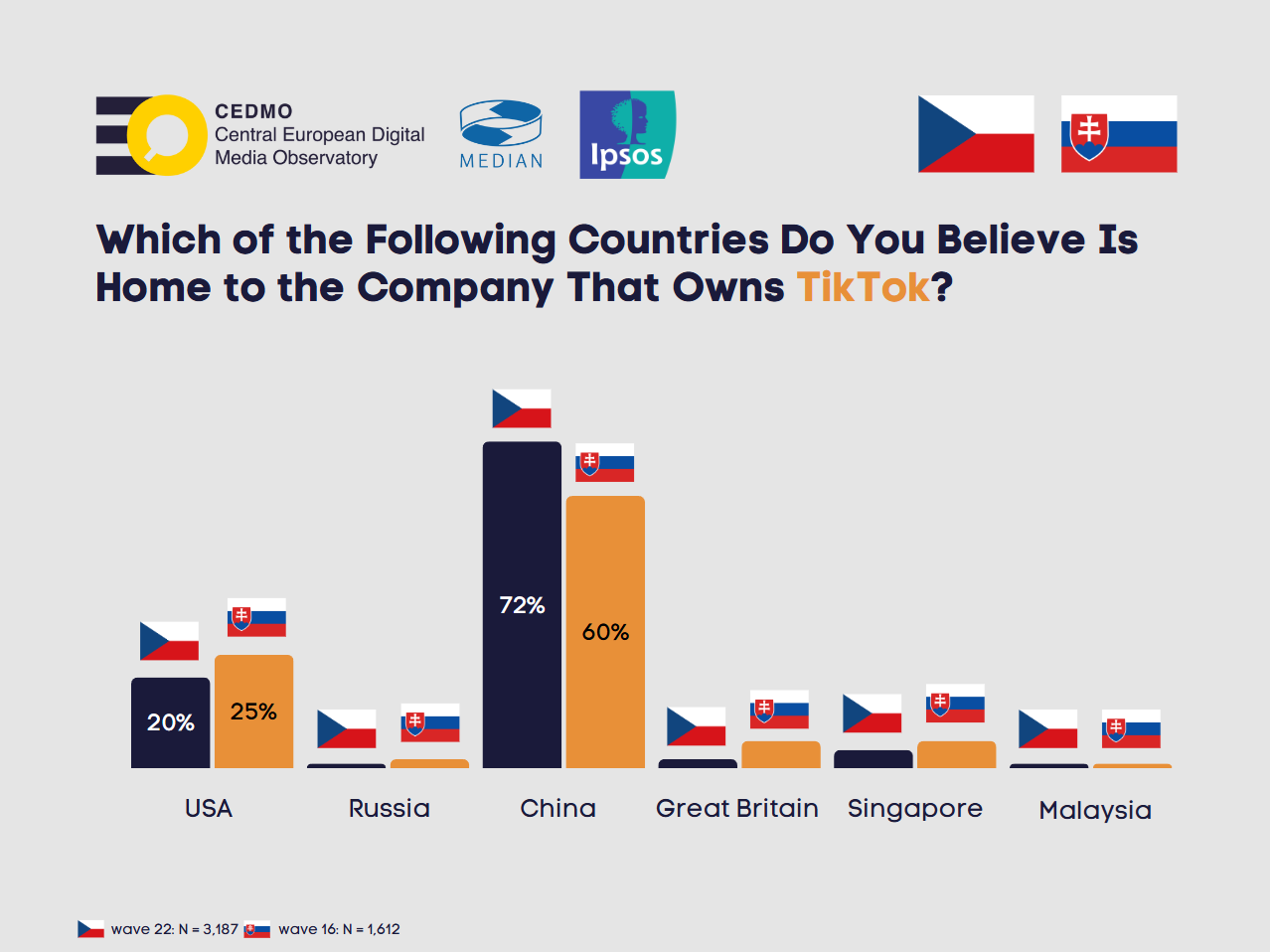
Both Czechs and Slovaks use social networks and chat platforms intensively, with Slovaks using them more than Czechs. However, Slovakia shows at the same time lower awareness and control of users over privacy settings. We have just published these findings, along with others, in a CEDMO Special Brief titled “Social Networks TikTok and X in a Comparative Czechoslovak Perspective”.
Chat platforms such as WhatsApp, Messenger or Telegram are used at least once a day by 53% of respondents in the Czech Republic and 67% in Slovakia. 44% of people in the Czech Republic and 53% in Slovakia use them more than once a day. Conversely, 14% of Czechs and only 8% of Slovaks do not use them at all, indicating a higher level of digitalisation of everyday communication in Slovakia.

Social networks such as Facebook, Instagram, X/Twitter or TikTok are used at least once a day by 49% of respondents in the Czech Republic and 65% in Slovakia. 37% of people in the Czech Republic and 49% in Slovakia use them more than once a day. Significantly more Czechs (24% vs. 12% of Slovaks) said they do not use these apps at all.

Social networks used and access to information security
Most users in both countries use or have past experience with Facebook, YouTube and Instagram. Even questions related to presence on specific social networks show that Slovaks are generally more active in digital communication. 85% of Czechs visit Facebook compared to 73%, the ratio is 69% to 61% for YouTube and 47% to 40% for Instagram. On TikTok, 20% of Slovaks are active compared to 17% of Czechs, and on Pinterest, the ratio is 25% to 19%. Only on some platforms do Czechs have a slightly higher proportion of users – for example, X is used by 14% of Czechs compared to 11% of Slovaks, and Discord by 11% of Czechs compared to 9% of Slovaks.
The fundamental difference between the two countries lies in their approach to privacy. While 43% of Czechs declare that they have specified visibility of posts for specific contacts or groups, only 8% of Slovaks do so. Another 28% of Slovak respondents, for example, do not know what visibility settings they have, while only 10% of Czech respondents confirmed the same.

A look at TikTok social network security
Awareness of TikTok’s Chinese origin is relatively high in both populations, especially in the Czech Republic. Most respondents from the Czech Republic and Slovakia correctly associate this channel with China. While in the Czech Republic, 72% of the research participants demonstrated this knowledge, in Slovakia the proportion was lower – 60%. At the same time, however, a relatively large proportion of people think that TikTok service originates from the USA (20% of respondents in the Czech Republic, 25% in Slovakia).

Outflow of users from X/Twitter after its purchase by Elon Musk
With the purchase of the Twitter platform by controversial billionaire Elon Musk in October 2022 and its subsequent renaming to X, there has been a noticeable decline in daily users in the United States.
“The use of the social network X (formerly Twitter) has never been a society-wide phenomenon in the Czech Republic or Slovakia. Only half of the Czech population (53%) and two-fifths of the Slovak population (40%) are aware of it. A significantly smaller proportion of both societies have used it at least once, 14% in the Czech Republic and 11% in Slovakia. Changes in attitude towards use after the change of ownership can therefore only be observed in a small part of the population in both countries,” says CEDMO data analyst Lukáš Kutil from Charles University, adding, “45% of Czech and 55% of Slovak users reduced their use of this medium after Elon Musk bought it, while 25% of Czech and 20% of Slovak respondents stopped using it altogether.”
Users have had various reasons for limiting or abandoning Service X. Most often, the behaviour of its new owner Elon Musk – this reason was given by more than half of users from the Czech Republic (52%) and a third from Slovakia (33%). A large proportion were bothered by the ideological direction of the content of the posts (42% in the Czech Republic, 30% in Slovakia). Other reasons cited by users included a preference for another platform, lack of free time or user exclusivity.
Of those who use or have used social network X, 42% of people in the Czech Republic and 45% in Slovakia perceive it as supporting freedom of speech, while 28% of Czechs and 27% of Slovaks have the opposite opinion and believe it limits freedom of speech. On the issue of the purposeful dissemination of false statements, negative perceptions are significantly more prevalent. 51% of respondents in the Czech Republic and 43% of respondents in Slovakia consider X to be a supporter and disseminator of lies and half-truths. This corresponds, for example, with the view that this platform encloses people in opinion bubbles (76% in the Czech Republic and 42% in Slovakia) and damages mental health (52% of Czechs and 57% of Slovaks agree with this statement).
Disinformation related to Channel X and its owner Elon Musk
Social network X (formerly Twitter) owner Elon Musk is a frequent target of false and misleading posts that have been repeatedly fact-checked by fact-checking organizations at CEDMO. For example, a gesture reminiscent of a Nazi salute that Musk made after the inauguration of US President Trump sparked much controversy. Immediately, posts began circulating with photos suggesting that the same gesture had been made publicly by Barack Obama or Kamala Harris in the past. However, according to Demagog.cz’s analysis, politicians have made other, quite common gestures. In the past, a video of an interview with Elon Musk was also circulated, but it was accompanied by a fake Russian dubbing that overlaid Musk’s original statement and put admiring words in his mouth towards Russia and Vladimir Putin.
However, Elon Musk himself is a frequent disseminator of false and misleading posts. In October 2023, for example, he shared a video purporting to prove the ineffectiveness of the covid-19 vaccines, but as AFP pointed out, the video lacked key information and contained no relevant evidence; instead, available studies have repeatedly shown that the vaccines reduce the risk of severe disease. Musk also shared a fake video claiming that USAID was paying Hollywood celebrities millions of dollars to visit Ukraine. As AFP pointed out, it was a fake report created by artificial intelligence without any factual basis.
Like Musk, the social network he owns, X, has faced criticism for its approach to the issue of misinformation and disinformation. In fact, the authors of such viral content can be financially rewarded. According to an analysis, AFP the network profits from war propaganda and climate change denial – for example, by spreading pseudo-scientific texts that question climate change. Experts also criticise the “blue pipe” system, which was originally designed to verify identities but now often reinforces the credibility of disinformation accounts.
Fraudulent ads and deepfake videos repeatedly circulate on social media, including on Platform X, using the faces and voices of famous people – politicians, doctors or celebrities – to promote fictitious investment platforms or miracle cures. Demagog.cz has documented cases of deepfake videos exploiting the faces of Andrej Babiš, Petr Fiala, Zbyněk Stanjura, Robert Fico, Pavel Pafko and Petr Čech, among others, or fraudulent posts featuring Marketa Pekarova Adamová and Petr Pavel. These posts often contain headlines such as “Unexpected live confessions” and link to fraudulent sites mimicking news websites where users are invited to enter personal data or make a financial investment that may actually lead to a loss of money.
The thematic report is available in the following versions:
- CEDMO Special Brief (data Czech Republic, Slovakia) – in Czech
- CEDMO Special Brief (data Czech Republic, Slovakia) – in Slovak
- CEDMO Special Brief (data Czech Republic, Slovakia) – in English
*CEDMO Trends offers unique insight into how people are changing their media consumption habits, focusing on specific types of information disorders, like misinformation and disinformation. These not only weaken public trust in institutions that are essential for a functioning democracy, but can also amplify individual infodemics.
For CEDMO (Central European Digital Media Observatory), the research is conducted in the Czech Republic by the research agency Median on a representative sample of 2,700–3,200 respondents aged 16 and older. The CEDMO TRENDS research is funded in the Czech Republic by the National Recovery Plan under project 1.4 CEDMO 1 – Z220312000000 Support for increasing the impact, innovation, and sustainability of CEDMO in the Czech Republic.
In Slovakia, it is conducted by the IPSOS research agency on a representative sample of 1,600–2,300 respondents aged 16 and older. Data collection in Slovakia was funded by the National Recovery Plan under project MPO 60273/24/21300/21000 CEDMO 2.0 NPO.
The CEDMO Special Brief “Social Networks TikTok and X in a Comparative Czech-Slovak Perspective” was created with the support of the National Recovery Plan as part of the MPO 60273/24/21300/21000 CEDMO 2.0 NPO project.
